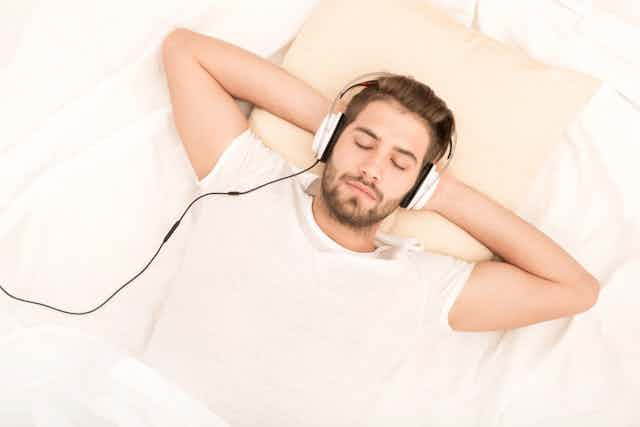In our hectic world, a good night’s sleep is worth its weight in gold when it comes to improving physical and mental well-being. Much more than a basic method of energy conservation, sleep is a state during which muscle and bone are generated and repaired, and memories and learning systems are updated. Sleep also allows the body and brain to clear out the toxic byproducts of the day’s waking activity that might otherwise build up and cause harm. In short, good sleep is a cornerstone of human health.
Sadly, not all of us are blessed with the bounty of a good night’s slumber after a long and often tiring day. Around 30% of adults experience chronic insomnia at some point in their life – where sleep is disrupted for more than a month. Estimates are even higher in older populations and those who experience regular stress.
Insomnia can be devastating, and has been linked to cognitive deficiencies – such as memory lapses, psychological problems including mood and anxiety disorders, and long-term health concerns including obesity and dementia. The most severe cases of chronic insomnia can even increase the risk of mortality.
The cost of insomnia goes well beyond just health. According to the National Sleep Foundation, insomniacs are two to four times more likely to have an accident – with over 72,000 traffic accidents a year in the US alone linked to sleep deprivation. Insomnia also costs US companies an estimated $150 billion in absenteeism and reduced productivity, every year.
Given our need for regular and deep sleep, it is no surprise then that people with insomnia often reach for the medicine cabinet. Pharmacies in the UK regularly dispense more than 15.3m prescriptions for sleep aids. But this is not the safest route to a good night’s slumber, as the use of over the counter and prescription sleep aids can lead to harmful side effects, dependency and withdrawal.
Music for sleep?
Research has shown that listening to “self-selected” music – music of your choice – can actually shorten stage two sleep cycles. This means people reach restful REM sleep – the restorative part of our sleep – more quickly.
In the study, students who listened to 45 minutes of music before bedtime for three weeks saw a cumulative positive effect on multiple measures of sleep efficiency with similar effects reported in older citizens in Singapore. Following all this evidence, the NHS now recommends “listening to soft music” before bedtime as a method to prevent insomnia.
With all this in mind, our research unit, along with colleagues from the Sleep and Cognition Laboratory at the University of Lincoln and Goldsmiths, University of London, has embarked on a new music sleep project, to find out what people listen to when they are nodding off – and why people believe music helps their sleep.

The first phase of our music sleep survey has been completed by 651 people, who have told us a great deal about the music that helps them to sleep. We discovered the top rated composer of sleep music in our sample is Johann Sebastian Bach. He was followed by Ed Sheeran, Wolfgang Amadeus Mozart, Brian Eno, and Coldplay.
Aside from those few top rated artists, there was an enormous variety of individual choices – with 14 different genres and 545 different artists named. And it is this data which will give us the basis to examine the features of effective sleep music. Using computer programs we will be able to pin down the consistent musical features that support sleep among these many diverse musical sounds.
Face the music
We also found out a lot about the reasons why people are turning to music in the first place. And they are varied. In our research, people highlighted the importance of music for blocking disruptive external (such as traffic) and internal (like tinnitus) sounds, for filling uncomfortable silences, and providing a sense of companionship and security.
This suggests that a one size fits all approach to music for sleep is unlikely to suit all insomniacs, because people are tuning into so many different types of music for so many different reasons.

The next step for our research will be to expand our survey to cover as many populations and cultures as possible. We will then test the music that people report to be consistently effective at different stages of sleep using advanced sleep recording techniques.
Our aim is to develop personalised music selection technology, combined with advice on music sleep strategies, as a complete package for people who need to restore their sleep to normal for the sake of their health, quality of life and well-being.
Until then, the best advice we can offer when choosing music to put you to sleep is to trust your own musical choices over generic “sleep” playlists. You know best what you are looking for in a bedtime track – based on what you like and what you need from the music at the time. And in the near future we will be armed with the necessary evidence that will allow us to move from this “instinctive approach” to a more informed and optimised application of music as an effective aid in the battle against insomnia.

